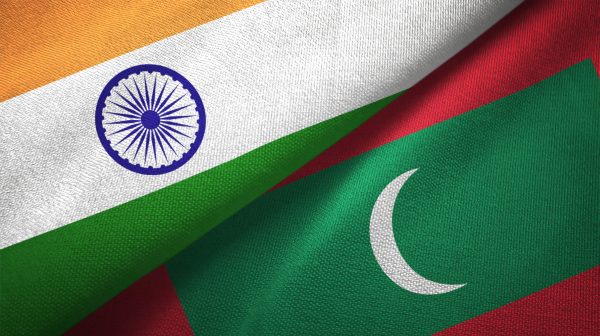In today’s fast evolving, dynamic and economically competitive world, it is a proven fact that mutual cooperation and friendly relations with neighbouring countries is a prerequisite for fostering growth and development. With this thought in mind, India too has maintained a healthy geo-political balance in the Indian Ocean Region (IOR). India’s vision of Security and Growth for All in the Region (SAGAR) is in line with ensuring a stable and friendly neighbourhood, capable of handling all contingencies ranging from man-made to natural disasters.
Among the various friendly neighbours of India, Maldives is one that has been an area of immense cooperation and mutual interest. And while the past few years have seen a see-saw in relations, India’s steady and sustained efforts in providing economic, medical and military assistance to Maldives in the past decade and especially during the COVID pandemic are worthy of discussion.
“India has always been the Maldives’ closest ally and trusted neighbour, extending constant and consistent support to the people of Maldives on all fronts.”
– statement by Maldives government
The previous Maldivian government under President Abdulla Yameen (who since his presidential tenure has been fighting allegations for bribes and money laundering) was heavily tilted towards China. However, China’s Sri Lankan debt trap and the increased presence of Chinese submarines in Maldivian waters created fear, alertness and disquiet in Maldives, leading them to look towards other regional powers like India, for partnership and investment. After President Ibrahim Mohamed Solih assumed office in November 2018, Maldives has shown immense goodwill and keen interest in cooperating with India in several areas of joint efforts.
Maldives and India’s shared past goes long back – Be it India’s pro-active approach to defeating a coup attempt on the Maldivian government in 1988, or establishing medical complex and academic institutes in 1995/96, or their assistance and efforts during the 2004 Tsunami crisis, 2014 Male water crisis or even the very recent Covid-19 pandemic – none of these have gone unnoticed. India’s timely health and humanitarian assistance in the form of visits by teams of doctors and specialists to assist Maldives in Covid-19 preparedness, donations of vaccines and essential medicines, food aid etc have garnered lot of respect and appreciation for India and her military forces. Amidst the Covid pandemic, India also extended an urgent financial assistance of $250 million (soft loan) to Maldives along with series of economic and financial initiatives, to revive Maldivian economy and provide budgetary cushion to their dwindling revenues which are primarily driven by tourism.
There have been additional developmental projects like – the $500 million Greater Male Connectivity Project (GMCP), which will connect Male with three neighbouring islands by construction of a bridge and causeway link spanning 6.7 km; the creation of an air bubble with Maldives to facilitate movement of people from both sides for employment, tourism and medical emergencies; the direct cargo ferry service between the two nations to enhance sea connectivity, provide predictability in supplies and reduce logistics cost for India-Maldives trade – which would boost tourism and therefore the economy of Maldives. Both countries have recently also signed a $50 million Line of Credit (LoC) agreement and an agreement to develop Maldives National Defence Force Coast Guard to boost maritime and disaster relief capabilities of the nation and enhance regional maritime security, combat terrorism and control illegal activities on sea.
The new momentum in high-level exchanges and diplomatic visits including Maldives Defence minister’s recent six-day visit to India, leave no question on the importance that both countries place on this relationship. The cultural-educational exchanges, developing and grooming of Maldivian cricket and cricketers, cooperating in the field of energy efficiency and renewable energy, conducting joint-workshops with religious scholars of Maldives and liaising on various issues like hydrography, customs capacity building, disaster management, health etc – all these initiatives under India’s ‘Neighbourhood First’ policy have strengthened maritime ties and long-standing friendship between the two nations.
With shared ethnic and religious ties, over time both India and Maldives have been able to foster a relationship that is motivated by common goals of economic growth and progress. However, this deepening in relation has also attracted negative propaganda by other nations who have been trying to force their presence in the Indian Ocean Region (IOR). With the support of various individuals with vested interests these nations have been spreading online campaigns against India and Maldives. Although such campaigns will not discourage the strengthening relationship between the two countries but yes, it might delay development in Maldives.
“The Government firmly believes that these views are not the sentiments of the general public, but rather that of a small group of individuals with the objective of tarnishing the country’s long-standing cordial ties with India…The cooperation and support provided by the Government of India, specifically on issues of maritime security, is aimed at strengthening the strategic partnership between the two countries and to ensure the safety and stability of the Indian Ocean region”
– Maldivian Foreign Ministry statement about the online anti-India campaign
As maritime nations of IOR which are barely 70 nautical miles apart and which share historical, cultures and linguistic ties, the relations between India and Maldives calls for joint constructive efforts. With close understanding and cooperation not only will there be development for both nations but this will also ensure prosperity and peace amongst all littorals in the region. So what better time than now to ensure this, when the world is recovering from the devastating pandemic and every nation is looking for honest, supportive and true partnerships.

